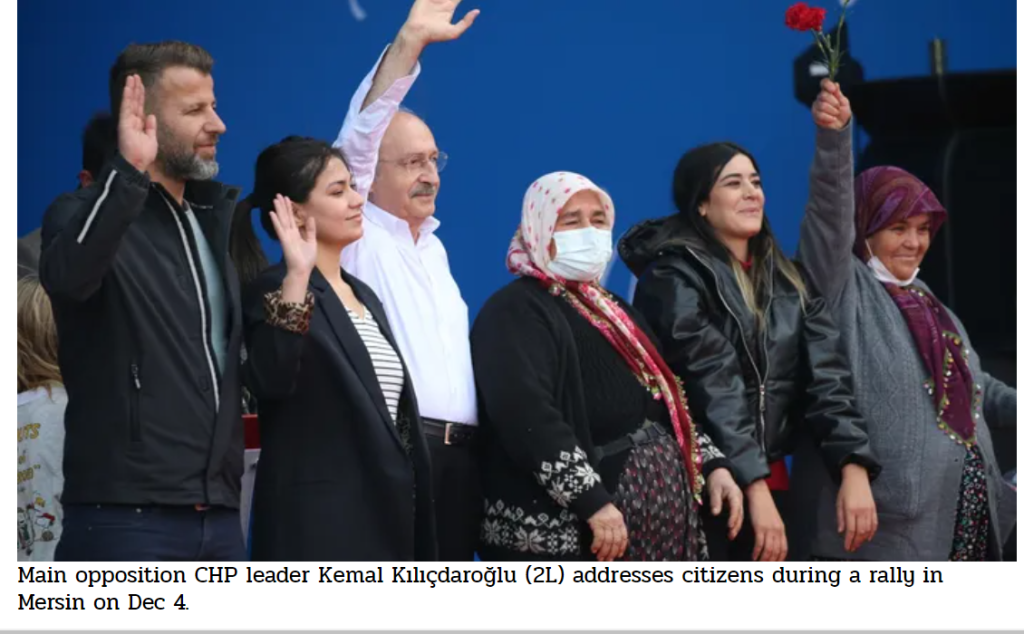A veteran Turkish political leader who has struggled for years to have President Tayyip Erdogan voted out of office says it is “very clear” that his dream is drawing nearer, even as doubts remain about whether he will be the main opposition candidate at presidential elections set for 2023.
In an interview, Kemal Kilicdaroglu, leader of the main opposition Republican People’s Party (CHP), confidently predicted victory at the polls as Turkey suffers economic hardships brought on by Erdogan’s unorthodox monetary policies.
The comments reinforce expectations Kilicdaroglu, 73, will be the presidential candidate of a six-party alliance in elections due by June 2023, though polls show several other opposition figures winning more support.
“Of course, five party leaders pronouncing me as candidate would be an honor. It also means they have trust,” he told Reuters in his office on the 12th floor of the CHP’s headquarters on the outskirts of Ankara.
The six anti-Erdogan party leaders would discuss their candidate later, but first need to agree on economic, social and other policies for their joint platform. It is “very obvious and very clear” that whoever they choose will become president, he said.
Turkish Opposition is Marching to Power
Kilicdaroglu said he saw no reason for Turkey’s purchase of Russian S-400 missiles that caused a rift with Washington. He also said he would overhaul the central bank’s leadership if elected.
Kilicdaroglu and other critics of the country’s authoritarian and Islamist drift sense their time may have come.
Erdogan’s polls have slid to multi-year lows after his unorthodox interest rate cuts sparked a currency crisis late last year, which in turn sent living costs soaring and deepened poverty especially among the president’s working class base.
The opposition bloc includes nationalists, liberals and conservatives – though not parliament’s third-biggest party, the pro-Kurdish People’s Democratic Party.
Can Selcuki of Istanbul-based pollster Turkiye Raporu said Kilicdaroglu has grown “bolder and more aggressive”, showing his determination to be the bloc’s candidate. But he remains the “weakest nominee” of the opposition hopefuls and unless his support grows, Selcuki predicted he could still pull out before the vote.
Turkey Heading for Early Elections
CHP parliamentarian Utku Cakirozer said Kilicdaroglu’s ability to build alliances was key to broadening the opposition platform. “He is open to building bridges with different parts of society,” he said.
Though the opposition bloc has not named a presidential candidate, surveys by Metropoll show Kilicdaroglu is far less popular, at 28.5%, than three other possible names and then Erdogan himself, who 37.9% said they preferred in December.
Ankara Mayor Mansur Yavas and Istanbul Mayor Ekrem Imamoglu, both of the CHP, had popularity of 60.4% and 50.7% respectively, while IYI Party leader and alliance bloc member Meral Aksener had 38.5%. A previous Metropoll survey showed Kilicdaroglu was the only potential candidate whom Erdogan would beat.
On the other hand, other polls suggest Erdogan would lose against any candidate, unless he manages to improve the economy. Kilicdaroglu and CHP mayor Imamoglu also have a better following among the Kurdish voters, who are believed to become the key swing voters in the next presidential contest. Additionally, Kilicdaroglu is known to share power and appears less likely to use the office of presidency to advance his policies. He is probably the best candidate to run a diverse coalition of 6 opposition parties, as well keep the pro-Kurdish HDP in tow, if additional votes are needed in the assembly to pass critical legislation.
“These surveys are of no importance for today,” Kilicdaroglu said, adding that Yavas and Imamoglu would continue running the country’s two biggest cities.
Soaring prices recently – including 50% increases for electricity and 55% for food – have pushed more Turks into poverty.
RUSSIAN S-400S, SYRIA
Ankara’s purchase of Russian S-400 land-to-air defenses badly strained U.S. relations, prompting Washington to sanction Turkey’s defense industries and oust it from an F-35 production scheme.
“Who will we use the S-400s for? We haven’t received the answer to this question yet,” Kilicdaroglu said. “A large amount of money was paid, and they are currently waiting in storage.”
Erdogan has said Turkey is keeping the missiles despite U.S. objections and the possibility of selling them.
Turkey will send home the millions of Syrian refugees it hosts and re-establish diplomatic ties with President Bashar al-Assad if the opposition alliance wins the elections, Kilicdaroglu said.
“If needed the United Nations needs to get involved, a 100% guarantee should be received from Assad. That guarantee needs to be tied to international accords, that he will not attack them, that their material and life security will be preserved,” he said.
Turkish press reported on Monday that CHP-possibly with input from other alliance members—is drafting a list of candidates to replace top bureaucrats, not subject to civil service tenure. The next president will appoint to key positions like National Intelligence Service, the Directorate of Religious Affairs, the High Education board and several judges to Turkey’s top 4 High Courts.
In other interviews, Kilicdaroglu and other members of the opposition swore to improve relations with EU and remain loyal to NATO.
Additional reporting by Tuvan Gumrukcu and Ece Toksabay in Ankara, Daren Butler and Birsen Altayli in Istanbul; Writing by Daren Butler; Editing by Dominic Evans and Alistair Bell, DİKEN, ParaAnaliz
Follow our English language YouTube videos @ REAL TURKEY:
https://www.youtube.com/channel/UCKpFJB4GFiNkhmpVZQ_d9Rg
And content at Twitter: @AtillaEng
